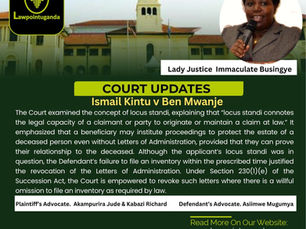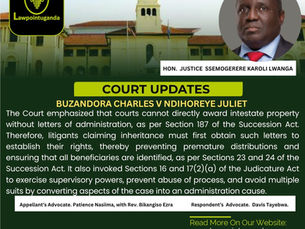top of page
BLOG POSTS
DISCLAIMER
This blog does not contain legal advice. The legal information is provided for general informational and educational purposes only and is not a substitute for professional advice. Accordingly, before taking any actions based on such information, we encourage you to consult with the appropriate professionals. Authors are liable for any plagiarism and Lawpoint Uganda won`t have liability towards the same.


High Court at Kabale Dismisses Appeal, Rules That 2008 Gift Deed Made Without Letters of Administration Is Invalid.
The Court noted that the memorandum of appeal did not reference a decree and final orders of the lower court, and that none was present on the record. The Court held "An appeal lies from a decree or order, not merely a judgment. Absence of an extracted decree is a recognized defect in appellate practice."

Atukunda Joan (Patel)
Feb 164 min read


High Court at Kabale Affirms That Even Under Customary Law, Gifts Must Be Perfected During the Donor’s Lifetime: Post-Death Ceremonies, Possession, or Gift Deeds Cannot Cure an Uncompleted Gift
The court clarified that although one has been gifted land, the gifting must be a gift inter vivos. citing the case of Kakembo & 4 others v Nakato (civil suit 305 of 2022) [2025] UGHCFD 21, the validity of a gift inter-vivos, mainly involving land, depends on its completion during the donor's lifetime. Court further emphasized that the deceased's transfer of land to the Respondent was not complete and not perfected, citing the case of Ssekamwa Sande (Adminsitrator of the Esta

Waboga David
Feb 46 min read


High Court Holds: “Not Every Mental Illness Equates to Lack of Mental Capacity, The Mental Health Act Protects the Legal Capacity of Persons with Mental Illness”
The Court emphasized that mental illness does not automatically equate to lack of legal capacity and underscored the importance of due process under the Mental Health Act. The Court adopted the statutory definition under Section 2 of the Mental Health Act: “Mental capacity means the independent and informed cognitive ability to understand the nature and effects of one’s decisions and actions.” Relying on prior jurisprudence, the Court held that while a formal diagnosis is not

SSALI JUNIOR JOHN NDIGEJJERAWA KIGONGO
Jan 293 min read


The Payment of Dowry Shortly Before a Church Wedding May Be Regarded as Preparatory to a Formal Marriage Rather Than Evidence of a Separate Customary Marriage, The High Court Rules
The Court held that claims of customary marriage or cohabitation must be expressly pleaded and strictly proved, and that the payment of dowry shortly before a church wedding may be regarded as preparatory to a formal marriage rather than evidence of a separate customary marriage.

Waboga David
Jan 36 min read


Court at Mbale Declines Registration and Enforcement of a Kenyan Succession Judgment over Ugandan Land, stating that foreign grants of probate or LOA have no legal effect unless resealed by High Court
Letters of administration or probate granted abroad must be resealed by the Ugandan High Court under the Probates (Resealing) Act (Cap 266) to have legal effect in Uganda. Failure to do so invalidates locus standi for related proceedings.

Waboga David
Jan 25 min read


High Court at Kabale Holds That Occupation of Land as a “Caretaker” (Licensee) Negates the Intent to Possess (animus possidendi) Required for Adverse Possession
The Court stated that the appellant erased section 110 defence of the evidence by introducing a new cause of action by asserting a marriage gift. court further observed that permissive occupation (licence) negates the animus possidendi essential for adverse possession. a licence by law does not confer title. court sought that the process to dispose of the suit was to open an administration cause. Ground 1 failed and ground 2 was upheld. the appeal partially succeeded

SSALI JUNIOR JOHN NDIGEJJERAWA KIGONGO
Dec 18, 20255 min read


High Court of Kabale Rules That Land Under Development or Not Used as the Matrimonial Home Is Not Family Land Requiring Spousal Consent, and Affirms Validity of Sale and Bona Fide Purchaser Protection
Spousal consent under the Land Act only applies to land that meets the statutory definition of "family land"—i.e., land where the family ordinarily resides or derives sustenance at the time of the transaction. Developing property (at slab level) may not qualify.

Waboga David
Dec 6, 20256 min read


Court of Appeal Upholds Sale of Estate Land by Beneficiaries Before Grant of Administration
The court found that the vendors sold their beneficial interest in the estate land. “The thrust of that provision [S. 188 of the Succession Act] is that actions made in the course of administration relate back to the time of death of the deceased. The effect is that the grant of letters of administration validates legitimate actions of the administrator(s) taken prior to the grant in respect of the estate of an intestate. Specifically, actions which would ordinarily amount to

Waboga David
Dec 5, 20257 min read


An administrator who filed a suit while the grant was still valid retains locus standi to pursue all consequential proceedings, including appeals, notwithstanding the later expiry of the letters.
Letters of administration remain valid for two years, However, any suit instituted during their valid life remains valid throughout, including on appeal. Expiry does not extinguish locus standi for proceedings already commenced.

Waboga David
Dec 5, 20257 min read


High Court at Kabale Clarifies When Spousal Consent Applies and Distinguishes Family Land from Matrimonial Property, and Temporary Gifts
The Court established that a finding of matrimonial property is normally associated with the dissolution of a marriage, rather than death. in any event, death would end the marriage and the provisions of the law of succession under Section 2 of the succession act would apply. Court citing the case of Mary Martin V Kakuru Moses and 2 others HCT-11-CV-CS-0036, stated that the land may have become family land at the time the sale was entered into. in the instant case, once a fi

Waboga David
Nov 28, 20257 min read


“Cohabitation, no matter how lengthy or how genuine the parties’ belief in the existence of a marriage, does not create a valid marriage where statutory requirements are not met.” High Court Rules
The court found the 2018 customary marriage void ab initio under Section 11(e), which voids any customary marriage where "one of the parties has previously contracted a monogamous marriage which is still subsisting." The provision "is clear, unambiguous, and operates automatically by force of law" and "does not require any decree of court to render such a marriage void." Citing Elizabeth Nalumansi Wamala v. Tolly Kasande, the court noted: "void marriages are treated as non-ex

Waboga David
Nov 16, 20259 min read


High Court at Kabale Upholds Lower Court's Ruling on Competing Land Ownership Claims, Emphasizing Requirement for Letters of Administration in Estate-Derived Sales
The court found that the contradictory locations of signing (Rakai, Rwanda, Kisoro) undermined credibility. The appellant’s own witnesses conceded that the land was family land already sold earlier to the respondent. The court held that no beneficiary of the late Bahenga Yesaya could pass title without letters of administration. “Any right to the intestate’s property can only be established when letters of administration are granted by court.” — Buzandora Charles v Ndiroheye

SSALI JUNIOR JOHN NDIGEJJERAWA KIGONGO
Nov 16, 20257 min read


High Court Upholds Partial Right of Survivorship in Jointly Owned Land but Mandates Co-Administration for Estate Fairness in Succession Dispute
Under section 199 of the Succession Act, a surviving spouse ordinarily has the first right to be appointed administrator. However, this right is not absolute and may be limited by considerations of impartiality, competence, or fairness to other beneficiaries.

Waboga David
Nov 12, 20259 min read


Once a party to a matrimonial dispute dies, the cause of action based on marriage or matrimonial property becomes untenable. Claims must thereafter be pursued through succession proceedings, not civil
The Court faulted the trial magistrate for ignoring succession law during the locus visit, where the record (p. 18) shows counsel noting: "Bikangiso: When we went to locus, this court advised that since the defendant died, there was need to appoint an administrator to see whether the 1st defendant left properties to this estate and also to see whether this matter can be settled out of court." The Court proceeded "on an impermissible error," as "the correct law for resolution

Waboga David
Nov 7, 20254 min read


Courts will not interfere with expert valuations in matrimonial or property disputes absent of a “manifest error”: High Court at Wakiso overrules application for review of valuation report.
“Mathematical precision and exactitude are not attributes of property valuation; at best, valuation is an opinion based on technical expertise and prevailing market factors.”

Waboga David
Nov 7, 20254 min read


Prolonged separation and failure to maintain or communicate constitute clear evidence of a marriage that has irretrievably broken down. Court at Mengo Affirms.
“To establish desertion, two things must be proved: first certain outward and physical conduct – the factum deserendi – and secondly the animus deserendi – the intention underlying this conduct to bring the matrimonial union to an end.”

Waboga David
Nov 4, 20254 min read


“While the Plaintiff Lacked Locus Standi, the Defendant’s Failure to File an Inventory Justified Revocation of Letters of Administration — High Court at Kampala Rules”
Whereas the plaintiff lacks locus standi, the same does not justify the defendant’s inability to fulfill his obligations... failure to file an inventory is a just cause for revocation... the filing of an inventory is a court order premised on the wording of the grant, the breach of which is punishable... In the premises, it is my considered opinion that just cause has been furnished to warrant the revocation of the letters of administration.”

Waboga David
Oct 25, 20255 min read


High Court Clarifies rules on procedural irregularities, proof of land ownership, & locus visits. Letters of administration issued in disregard of a valid Will are invalid and cannot confer ownership.
The Court referred to Practice Direction No. 1 of 2007, emphasizing that: “During the hearing of land disputes, the court should ensure that parties and their witnesses are present at the locus, evidence is adduced, and proceedings are recorded.” Justice Echakokit found no procedural irregularity that prejudiced the Appellant, holding that the Chief Magistrate’s approach substantially complied with the requirements.

Waboga David
Oct 19, 20255 min read


Under Section 256(2) of the Succession Act, Letters of Administration remain valid for two years from the date of grant. There is no need for validation within this period unless they've expired
A moot prayer is one, that even if it is granted, it would have no practical effect on the rights or obligations of the parties before the Court. The law is clear that courts do not entertain applications seeking reliefs which are purely academic or devoid of any operative effect.

Waboga David
Oct 11, 20254 min read


Buganda Customs of Heirship Do Not Confer Exclusive Ownership on a Single Heir: The Primacy of Legal Title and Estate Administration Determines Property Rights, Rules the High Court at Kampala.
The court clarified that the suit land is not ancestral but part of Adonia’s estate, emphasizing the importance of proper estate distribution and title transfer. The court clarified that Buganda customs of heirship do not confer exclusive ownership emphasizes the primacy of legal title and estate administration in determining property rights.

Waboga David
Oct 9, 20258 min read


The property of a deceased intestate cannot be directly claimed in court without obtaining letters of administration. Even rightful heirs must pursue succession proceedings, High Court in Kabale Rules
The High Court emphasized that no rights to intestate property can be established without letters of administration. It also invoked Sections 16 and 17(2)(a) of the Judicature Act to exercise supervisory powers, prevent abuse of process, and avoid multiple suits by converting aspects of the case into an administration cause. Reference was made to precedent in Kiiza v Uganda (Misc. Application No. 118 of 2025) for using inherent powers to address legislative gaps.

Waboga David
Oct 4, 20254 min read


High Court at Kampala (Family Division) revokes fraudulent grant of Letters of Administration, affirms that removal of a caveat on land without notice to the caveator violates natural justice.
The Court observed that the Administrator General is vested with statutory and fiduciary duties to exercise due diligence when issuing Certificates of No Objection. It noted that in this case, the 2nd Defendant ignored clear records in the Succession Register showing that the deceased had died in 1939 and that his estate had already been distributed. By nevertheless issuing a Certificate of No Objection in 2008, the Administrator General failed in its public duty of care. The

Waboga David
Oct 2, 20256 min read


The High Court at Mbale clarifies principles on fraudulent procurement of Letters of Administration, reaffirms that unregistered Islamic marriages remain valid under the law.
The court reaffirmed that a widow is the most suitable person to obtain a representation of her deceased husband's estate. In the normal case of events, she is the person who would rightfully, properly, and honestly safeguard the assets of the estate for herself and her children. Given their fraudulent conduct and unilateral dealings with estate property, the Court found the Plaintiffs unsuitable to administer the estate.

Waboga David
Oct 1, 20258 min read


High Court at Luwero Upholds Jurisdiction in Divorce Petitions Involving High-Value Matrimonial Assets but Mandates Territorial Transfer
The High Court affirmed its unlimited original jurisdiction to entertain divorce petitions under Article 139(1) of the Constitution, even where both parties are Africans (per Section 3 of the Divorce Act), particularly to avoid procedural delays in cases potentially involving matrimonial assets exceeding UGX 50,000,000. However, the Court emphasized strict adherence to territorial jurisdiction under Section 15(a) of the Civil Procedure Act, transferring the matter to the High

Waboga David
Oct 1, 20254 min read
Follow us:
bottom of page



















.jpg)
